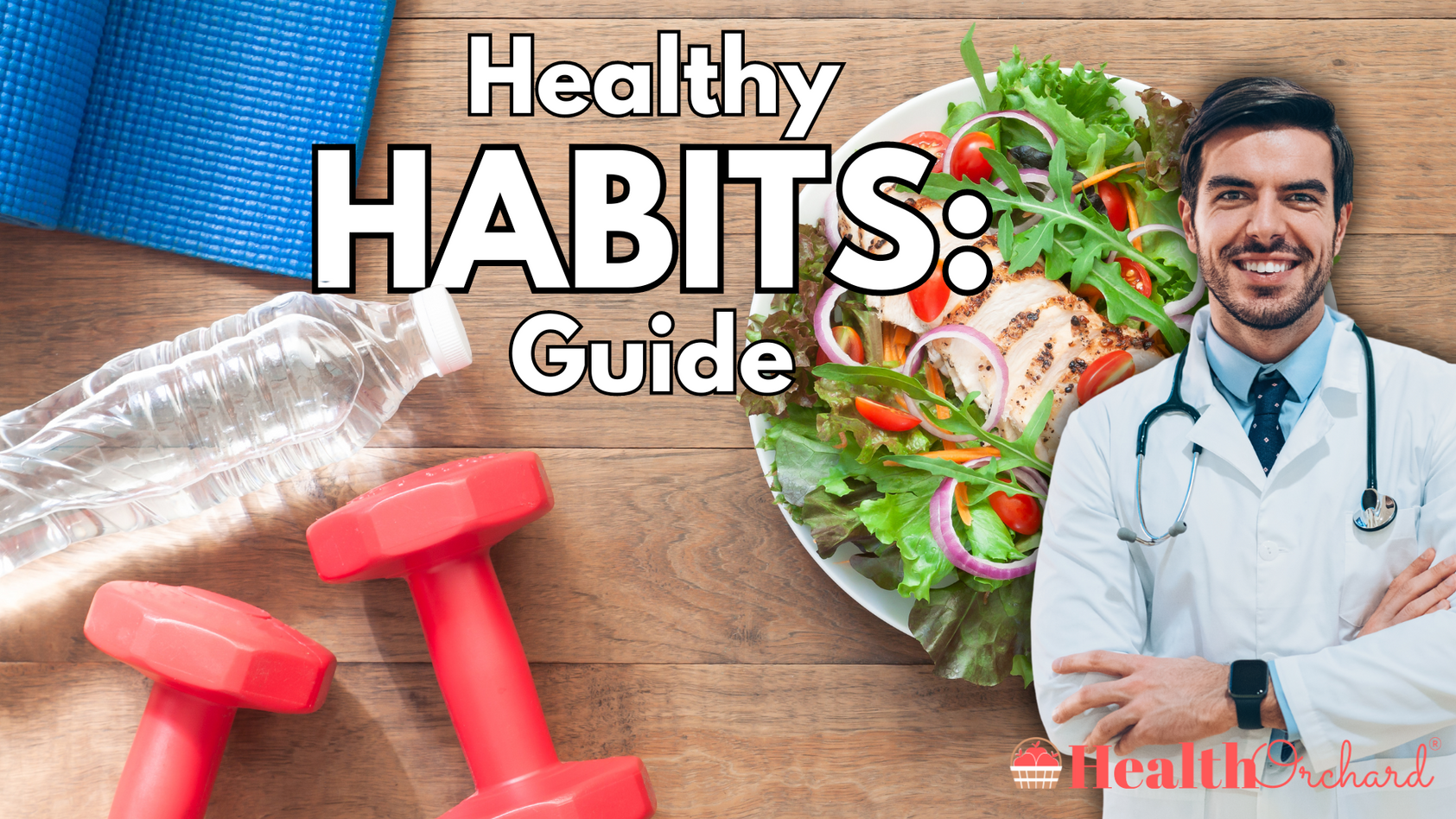

Healthy Habits: Guide
Key Takeaways
- Regular exercise: Aim for at least 150 minutes of moderate or 75 minutes of vigorous activity weekly.
- Balanced diet: Include a variety of fruits, vegetables, proteins, whole grains, and healthy fats.
- Hydration: Drink at least 2.7 to 3.7 litres of water daily.
- Mindful eating: Focus on the sensory experience of eating and avoid distractions.
- Quality sleep: Strive for 7-9 hours of sleep per night and establish a consistent bedtime routine.
- Stress management: Practice mindfulness, meditation, or engage in hobbies to reduce stress.
- Supplements: Consider taking multivitamins and other supplements to fill nutritional gaps.
Did you know that the U.S. Department of Health and Human Services recommends at least 150 minutes of moderate aerobic activity or 75 minutes of vigorous aerobic activity each week for most healthy adults?
Maintaining healthy habits is essential for a long and fulfilling life. Healthy habits encompass a range of practices that promote physical, mental, and emotional well-being. From a balanced diet and regular exercise to adequate sleep and mental health care, these habits contribute significantly to our overall quality of life. Additionally, supplements like multivitamins play a key role in filling nutritional gaps and supporting various bodily functions.
This guide will explore the benefits of healthy habits, provide practical tips for incorporating them into daily life, and highlight the importance of dietary supplements.

Benefits of Adopting Healthy Habits
1. Improved Physical Health
Healthy habits directly impact physical health. A balanced diet provides the necessary nutrients for body functions, while regular exercise strengthens muscles and improves cardiovascular health. Adequate sleep allows the body to repair itself, and stress management practices better your overall wellness. Together, these habits can prevent chronic diseases, boost the immune system, and increase energy levels.
2. Better Mental Well-Being
Mental health is closely linked to physical health. Regular exercise releases endorphins, which improve mood and reduce stress. Adequate sleep and a nutritious diet support cognitive function and emotional stability. Mindfulness and stress management practices help reduce anxiety and depression. By adopting healthy habits, individuals can improve their mental resilience and overall sense of well-being.
3. Increased Energy and Productivity
Healthy habits contribute to higher energy levels and improved productivity. A balanced diet fuels the body with essential nutrients, while regular exercise boosts stamina and reduces fatigue. Quality sleep ensures proper rest and recovery, allowing individuals to wake up refreshed and ready to tackle the day. Additionally, managing stress effectively can enhance focus and efficiency in daily tasks.
4. Prevention of Chronic Diseases
Adopting healthy habits is a powerful way to prevent chronic diseases. A nutritious diet, regular exercise, and adequate sleep reduce the risk of conditions such as obesity, diabetes, heart disease, and certain cancers. Supplements like multivitamins can also support overall health and reduce the risk of nutrient deficiencies that may contribute to these diseases.
Healthy Eating Habits
Importance of a Balanced Diet
A balanced diet is the foundation of good health. It provides the body with essential nutrients, including vitamins, minerals, proteins, carbohydrates, and fats. Here are some key components of a balanced diet:
- Fruits and vegetables: Rich in vitamins, minerals, and antioxidants, these should form a significant part of daily meals.
- Proteins: Essential for muscle repair and growth, good sources include lean meats, fish, eggs, beans, and nuts.
- Whole grains: Provide complex carbohydrates and fibre, aiding digestion and providing sustained energy.
- Healthy fats: Found in avocados, nuts, seeds, and olive oil, these fats support brain health and hormone production.
Tips for Maintaining a Balanced Diet
- Plan meals ahead to ensure a variety of nutrients.
- Include a mix of colours and types of food in each meal.
- Limit processed foods and sugary drinks.
- Stay mindful of portion sizes to avoid overeating.
Hydration
Staying hydrated is crucial for overall health. Water plays a vital role in digestion, nutrient absorption, and temperature regulation. It also helps maintain skin health and cognitive function.
Recommended Daily Water Intake
- Men: About 3.7 litres (13 cups)
- Women: About 2.7 litres (9 cups)
Tips for Increasing Water Consumption
- Carry a water bottle and drink regularly throughout the day.
- Infuse water with fruits or herbs for added flavour.
- Set reminders to drink water at regular intervals.
- Include hydrating foods like fruits and vegetables in your diet.
Hydro Homie Tip: Add electrolytes to your water, especially during intense physical activity or hot weather, to help replenish essential minerals lost through sweat and enhance hydration efficiency.
Mindful Eating
Mindful eating involves paying full attention to the experience of eating, noticing the flavours, textures, and smells of food. It helps prevent overeating and promotes a healthier relationship with food.
Benefits of Mindful Eating
- Helps recognize true hunger and fullness cues.
- Reduces emotional and stress-related eating.
- Enhances the enjoyment of food.
- Promotes better digestion.
Techniques to Practice Mindful Eating
- Eat slowly and savour each bite.
- Remove distractions, such as phones or TV, during meals.
- Listen to your body’s hunger and fullness signals.
- Focus on the sensory experience of eating.

Supplements for a Healthy Lifestyle
Multivitamins
Multivitamins are a convenient way to ensure the body gets essential nutrients that might be missing from the diet. They support various bodily functions and overall health.
Best Multivitamins for Men
Men have specific nutritional needs that can be met with targeted multivitamins. These often include:
- Vitamins A, Vitamin C, Vitamin D, and Vitamin E: Support immune function, skin health, and vision. Learn about vitamin D and it’s benefits.
- B Vitamins: Aid in energy production and red blood cell formation.
- Zinc and selenium: Support prostate health and testosterone levels.
Shop popular multivitamins for men
Best Multivitamins for Women
Women’s multivitamins are formulated to address unique health needs, including:- Calcium and vitamin D: Promote bone health.
- Iron: Essential for preventing anaemia, especially during menstruation.
- Folic acid: Important for reproductive health and pregnancy.
- Biotin and antioxidants: Support skin, hair, and nail health.
Shop popular multivitamins for women
Best Multivitamins for Seniors
As people age, their nutritional requirements change. Vitamins for seniors typically include:
- Vitamin D and calcium: Maintain bone density and prevent osteoporosis.
- Vitamin B12: Supports cognitive function and energy levels. Learn more about what vitamin B12 is.
- Omega-3 fatty acids: Promote heart health.
- Antioxidants: Help combat age-related oxidative stress.
Shop popular multivitamins for seniors
Best Multivitamins for Children
Children’s multivitamins ensure they receive essential nutrients for growth and development. Key components often include:
- Vitamins A, Vitamin C, and Vitamin D: Support immune function and bone growth.
- Iron and calcium: Both Iron and calcium are essential for growth and development. Learn more about what calcium is and why it’s so important.
- Omega-3 fatty acids: Support brain development and cognitive function.
Shop popular multivitamins for kids
Specialty Supplements for Healthy Habits
Sleep Aids
Quality sleep is vital for health. Natural sleep aids can help improve sleep quality without the side effects of pharmaceutical drugs.
Benefits of Sleep Aids
- Promote relaxation and reduce stress.
- Improve sleep onset and duration.
- Enhance overall sleep quality.
Common Natural Sleep Aids
- Melatonin: Regulates sleep-wake cycles.
- Valerian root: Promotes relaxation and reduces anxiety.
- Chamomile: Known for its calming effects.
- Magnesium: Supports muscle relaxation and nerve function.
Homeopathy
Homeopathy is a holistic approach to health that uses natural substances in minute quantities to stimulate the body’s self-healing processes.
Benefits of Homeopathy
- Treats a wide range of conditions with minimal side effects.
- Focuses on the individual rather than the disease.
- Can be used alongside conventional treatments.
Common Homeopathic Remedies
- Arnica: For bruising and muscle pain.
- Nux vomica: For digestive issues and stress.
- Oscillococcinum: For flu-like symptoms.
- Ignatia: For emotional stress and grief.
How to Choose the Right Supplements
Selecting quality supplements involves several considerations:
- Check labels for ingredients and dosages.
- Look for third-party testing and certifications.
- Consult with healthcare professionals for personalized advice.
- Consider your specific health needs and conditions.
- Buy from trusted vitamin and supplement sites like Health Orchard.
Exercise and Physical Activity
Importance of Regular Exercise
Regular physical activity is essential for maintaining a healthy body and mind. It helps control weight, reduces the risk of chronic diseases, improves mental health, and enhances overall quality of life.
Physical and Mental Health Benefits
- Weight management: Burns calories and builds muscle mass.
- Cardiovascular health: Strengthens the heart and improves circulation.
- Mental well-being: Reduces stress, anxiety, and depression.
- Bone and muscle strength: Prevents osteoporosis and maintains mobility.
Recommended Exercise Guidelines
- Adults: At least 150 minutes of moderate-intensity aerobic activity or 75 minutes of vigorous-intensity activity per week, plus muscle-strengthening activities on two or more days per week.
- Children and adolescents: At least 60 minutes of moderate-to-vigorous intensity physical activity daily.
Types of Exercises
Incorporating different types of exercises ensures a well-rounded fitness routine.
Cardiovascular Exercises
- Examples: Walking, running, cycling, swimming, and dancing.
- Benefits: Improves heart health, increases stamina, and aids in weight loss.
Strength Training
- Examples: Weight lifting, resistance band exercises, and body-weight exercises like push-ups and squats.
- Benefits: Builds muscle mass, increases metabolism, and strengthens bones.
Flexibility and Balance Exercises
- Examples: Yoga, Pilates, and stretching routines.
- Benefits: Enhances flexibility, prevents injuries, and improves balance and posture.
Creating a Workout Routine
Starting and maintaining a workout routine can be challenging but rewarding.
Workout Tips for Beginners
- Start slow: Gradually increase intensity and duration.
- Set realistic goals: Focus on achievable milestones.
- Mix it up: Combine different types of exercises to keep it interesting.
- Best supplements for working out: Consider incorporating the best workout supplements like protein powders, BCAAs (branched-chain amino acids), and pre-workout formulas to enhance performance, support muscle growth, and aid recovery.
How to Stay Motivated While Working Out
- Track progress: Use a journal or app to monitor your achievements.
- Find a workout buddy: Exercising with a friend can boost motivation.
- Reward yourself: Celebrate milestones with non-food rewards.
Incorporating Exercise Into Daily Life
- Use the stairs instead of the elevator.
- Walk or bike to nearby destinations.
- Take short active breaks during the workday.
Importance of Sleep
Benefits of Adequate Sleep
Sleep is a fundamental aspect of health, affecting both physical and mental well-being.
Physical and Mental Health Benefits
- Physical health: Supports immune function, repairs tissues, and maintains cardiovascular health.
- Mental health: Enhances memory, concentration, and emotional regulation.
- Energy and productivity: Ensures you wake up refreshed and ready for the day.
Recommended Hours of Sleep
- Adults: 7-9 hours per night.
- Teenagers: 8-10 hours per night.
- Children: 9-11 hours per night.
Tips for Improving Sleep Quality
Good sleep hygiene can significantly improve the quality of your sleep.
Creating a Bedtime Routine
- Stick to a consistent sleep schedule: Go to bed and wake up at the same time every day.
- Wind down before bed: Engage in relaxing activities like reading or taking a warm bath.
- Limit screen time: Avoid electronic devices at least an hour before bed.
Sleep-Friendly Environment
- Keep the bedroom cool, dark, and quiet.
- Invest in a comfortable mattress and pillows.
- Use blackout curtains or a sleep mask to block light.
Managing Sleep Disruptions
- Avoid caffeine and heavy meals close to bedtime.
- Practice relaxation techniques like deep breathing or meditation.
- Seek professional help if sleep problems persist.
Mental Health Practices
Stress Management
Managing stress effectively is crucial for maintaining mental and physical health.
Importance of Managing Stress
- Reduces the risk of chronic diseases.
- Improves mood and emotional stability.
- Enhances overall quality of life.
Techniques for Stress Reduction
- Meditation: Practicing mindfulness and focusing on the present moment.
- Deep breathing: Taking slow, deep breaths to calm the nervous system.
- Hobbies: Engaging in enjoyable activities to relax and unwind.
Mindfulness and Meditation
Mindfulness involves being fully present and aware of the current moment. Meditation is a practice that enhances mindfulness.
Benefits of Mindfulness Practices
- Reduces stress and anxiety.
- Improves focus and concentration.
- Assists with emotional regulation.
Simple Mindfulness Exercises
- Body scan meditation: Focusing attention on different parts of the body.
- Mindful breathing: Concentrating on the breath and its natural rhythm.
- Mindful walking: Paying attention to the sensations of walking.
Social Connections
Strong social connections are vital for mental health and well-being.
Role of Social Connections in Mental Health
- Provides emotional support: Sharing feelings and experiences with others.
- Reduces feelings of loneliness and isolation.
- Improves self-esteem and confidence.
Tips for Building and Maintaining Healthy Relationships
- Communicate openly and honestly.
- Show empathy and understanding.
- Make time for friends and family.
Start Your Journey to Healthy Habits with High-Quality Vitamins and Supplements
Adopting healthy habits is a powerful way to improve your overall quality of life. By focusing on a balanced diet, regular exercise, adequate sleep, and effective stress management, you can enhance both your physical and mental well-being. Popular supplements like multivitamins and natural sleep aids can support these healthy habits and fill nutritional gaps.
Health Orchard offers a wide range of competitively priced, high-quality vitamins and supplements that are rigorously tested for efficacy and safety. Our platform allows you to compare prices against popular vitamin sites and retailers like iHerb, Amazon, Walmart, All Star Health, Best Price Nutrition, Same Day Supplements, and more, ensuring you get the best value for your money.
Remember, it's never too late to start making positive changes, and even small steps can lead to significant improvements in your health. Start today and experience the transformative benefits of healthy living. Make the commitment to prioritize your health with the right vitamins and supplements from Health Orchard, and see how these simple changes can lead to a happier, healthier you.
Frequently Asked Questions about Developing Healthy Habits
1. What are the best healthy habits?
The best healthy habits are those that address various aspects of physical and mental well-being and can be sustained over time. Key habits include maintaining a balanced diet rich in fruits, vegetables, proteins, and whole grains; engaging in regular physical activity; ensuring adequate sleep; practicing mindfulness and stress management techniques; staying hydrated; and taking appropriate supplements to fill any nutritional gaps. Additionally, fostering strong social connections and making time for hobbies and relaxation contribute to a well-rounded, healthy lifestyle. By integrating these habits into your daily routine, you can enhance your overall health and quality of life.
2. What are the most important healthy habits to start with?
The most important healthy habits to start with include maintaining a balanced diet, engaging in regular exercise, ensuring adequate sleep, and practicing stress management techniques. A balanced diet provides essential nutrients for overall health, while regular exercise strengthens muscles and cardiovascular health. Adequate sleep allows the body to repair and rejuvenate, and stress management practices such as mindfulness and meditation help maintain mental well-being. Starting with these foundational habits creates a solid base for a healthier lifestyle and can prevent various health issues down the line.
3. How can I stay motivated to maintain healthy habits?
Staying motivated to maintain healthy habits involves setting realistic and achievable goals, tracking your progress, and rewarding yourself for reaching milestones. Begin with small, manageable changes and gradually increase your efforts as you build confidence. Keeping a journal or using a health-tracking app can help monitor progress and keep you accountable. Additionally, finding a workout buddy or joining a supportive community can provide encouragement and make the process more enjoyable. Celebrating your successes, no matter how small, can also boost your motivation to continue.
4. What should I do if I slip up or have a setback?
If you slip up or have a setback, it's important to acknowledge it without self-judgment, understand what caused it, and refocus on your goals. Analyze the situation to identify triggers or obstacles that led to the setback, and develop a plan to address them in the future. Remember that setbacks are a natural part of the journey towards better health and can provide valuable learning experiences. Reaffirm your commitment to your goals, make any necessary adjustments to your plan, and continue moving forward with a positive mindset.
5. How do I incorporate healthy habits into a busy lifestyle?
Incorporating healthy habits into a busy lifestyle requires planning ahead, making small changes, and prioritizing your health. Plan your meals and workouts in advance to fit into your schedule, and prepare healthy snacks to avoid unhealthy choices on the go. Look for opportunities to integrate physical activity into your daily routine, such as taking the stairs instead of the elevator or walking during lunch breaks. Schedule regular breaks to practice stress management techniques and ensure you get enough sleep by establishing a consistent bedtime routine. By making health a priority, you can find ways to include these habits even in a busy lifestyle.
6. Can small changes in habits really make a difference?
Yes, even small changes in habits can have a significant impact on your overall health over time. Simple adjustments like drinking more water, adding an extra serving of vegetables to your meals, or taking a short walk each day can accumulate into substantial benefits. These small changes are often more sustainable and less overwhelming than major lifestyle overhauls, making it easier to stick with them in the long term. Over time, these incremental improvements can lead to better physical and mental health, increased energy, and a lower risk of chronic diseases.
7. How do I choose the right multivitamin for my needs?
Choosing the right multivitamin depends on your age, gender, dietary restrictions, and specific health needs. Look for multivitamins that are tailored to your demographic group, such as those formulated for men, women, seniors, or children. Check the label for essential nutrients that may be lacking in your diet, and consider any specific health concerns you have, such as bone health or immune support. Consulting with a healthcare professional can provide personalized advice and help you select a high-quality multivitamin that meets your individual requirements.
8. Are sleep aids safe to use regularly?
Natural sleep aids are generally safe for regular use, but it’s best to consult with a healthcare professional before incorporating them into your routine. Common natural sleep aids like melatonin, valerian root, and chamomile can help improve sleep quality without the side effects associated with prescription medications. However, it's important to address underlying causes of sleep issues and practice good sleep hygiene in conjunction with using sleep aids. A healthcare professional can provide guidance on the appropriate type and dosage of sleep aid based on your specific needs and health condition.
9. What is homeopathy and how can it help me?
Homeopathy is a holistic approach to health that uses natural substances in minute quantities to stimulate the body’s self-healing processes. Based on the principle of "like cures like," homeopathic remedies are tailored to an individual's specific symptoms and overall health. Homeopathy can treat a wide range of conditions, from physical ailments like allergies and digestive issues to emotional concerns such as stress and anxiety. The remedies are generally safe and have minimal side effects, making them suitable for people of all ages. Consulting with a qualified homeopath can help determine the most appropriate treatment for your needs.







